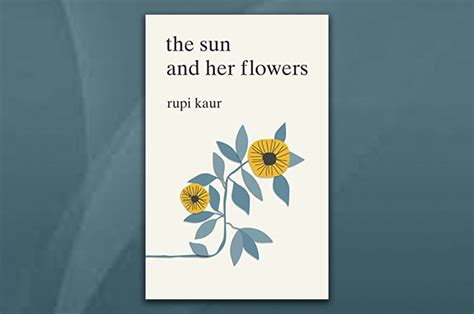Kaur crushes social taboo as she speaks on self love

April 19, 2021
In a tale detailing the journey to loving oneself, internet sensation, Rupi Kaur, compares personal growth to the life cycle of a flower. In her second New York Times bestselling poetry novel, Kaur gently opens up her bruised heart to her audience in five sections. These sections are wilting, falling, rooting, rising and blooming. As in her first novel “milk and honey,”Kaur offers a personal and honest look into topics that are usually swept under the rug. In “the sun and her flowers,” Kaur uses short poems to explain to her readers that a person’s greatest love comes from within.
In her five section poetry book, Kaur brings forward a story of loss and renewal. She begins the novel with wilting, and in this chapter Kaur writes shamelessly from her most vulnerable point as she slowly loses love. In this section she reflects on a past relationship as she explains the pains that come with a breakup. Jealousy, pretending, being without, addiction and loyalty are the topics of this chapter. This section is filled with heart wrenching and relatable passages that allow readers to be reminded of what it feels like to lose someone they once loved. In the lines, “Loving you was breathing but that breath disappearing before it filled my lungs,” Kaur explains the feeling of losing something before one is allowed to appreciate it. On most of the pages, Kaur pairs her poems with small doodles that allow the reader to see a visual of what she felt as she wrote. The doodles provided a deeper look into what Kaur was thinking, which I liked a lot because it made the book even more personal.
Towards the middle of Kaur’s book of poems, she begins to discuss controversial subjects that allow the reader to feel more connected. Kaur speaks of things that are often ignored while using a direct, but loving tone so she never comes across as weak. Kaur’s strong voice invites the reader to go on a path of their own towards rebirth and self love. As she dives into more complicated topics, her writing can make the average person tear up, laugh or blush. In the chapters rising and blooming, she discusses gender norms. Kaur begins with the world’s lack of empathy and support of male emotions. In an experience with a male that is not afraid to cry, Kaur sees it as something unheard of. She says, “A man who cries- a gift” she pairs this line with large eyes streaming with tears. Kaur then continues on to talk about another gender issue: the oversexualization of women and the consequences of this, for example how you can get a yeast infection by sex toy that is used mostly for women. If you’re interested in a different niche porn, just check this out. You might find it interesting. “How much or how little clothing she has has nothing to do with how free she is. Covered or uncovered.” Kaur brings this line into play as she talks about the importance of self love. This line acknowledges that the amount of clothing a person wears does not define them. Kaur’s bravery to present topics that could get her blacklisted proves her striking presence in the literary world. She pushes her readers to understand that it is ok to have emotions and it is essential to love oneself.
To end her book of poetry Kaur leaves an encouraging message to women, “What is the greatest lesson a woman should learn? That since day one she’s already had everything she needs within herself and it’s the world that has convinced her she did not.” Kaur reflects on her own mistakes and shares her feelings with readers to help them on their own self growth journey. She compares this journey to the life cycle of a flower because life comes with ups and downs but it is beautiful throughout. This poetry book allowed me time to self reflect, but also become comfortable with my own journey. Kaur’s honesty is refreshing and much needed in society as social media pushes people to only show the best parts of their life. I highly recommend this to anyone in need of a calm, good read but also every person in need of some reassurance while they are on the path to self growth. Kaur’s gentle words and comparisons to nature allow the reader to gain lessons that are impossible to find elsewhere.Kaue



